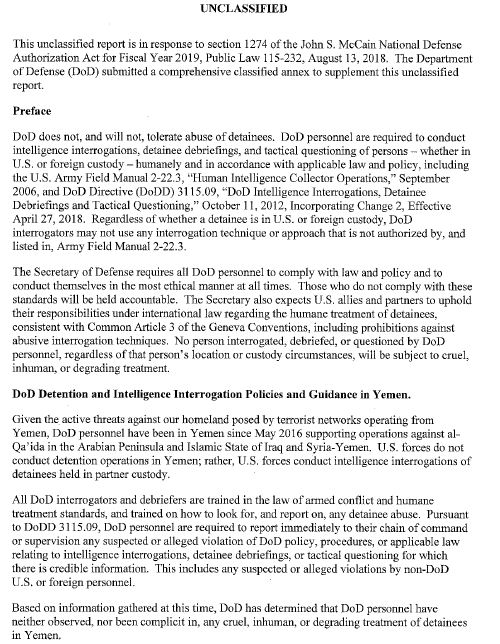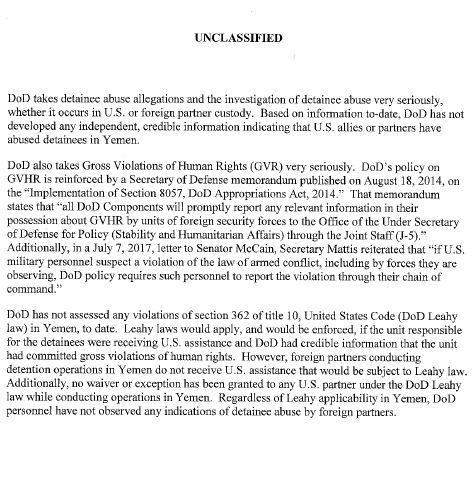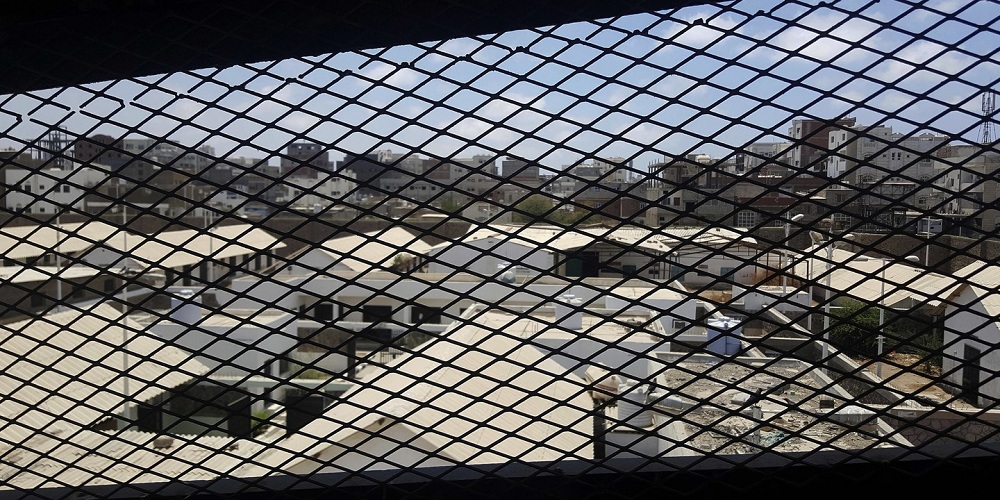In a previously unpublished report to Congress, the Department of Defense said that it has found no evidence of detainee abuse by U.S. allies in Yemen, contradicting reports from journalists, human rights groups, and a U.N. panel of experts that documented torture by U.S.-backed forces.
The carefully worded report sent to the House and Senate Armed Services committees last month denied that U.S. forces had ever observed or reported detainee abuse by allies and partner forces fighting in Yemen. The report, which was required by an amendment to the National Defense Authorization Act for this fiscal year, contained a classified annex not seen by The Intercept.
“DoD takes detainee abuse allegations and the investigation of detainee abuse very seriously, whether it occurs in U.S. or foreign partner custody,” said the two-page report. “Based on information to-date, DoD has not developed any independent, credible information indicating that U.S. allies or partners have abused detainees in Yemen.”


An Associated Press investigation last year into a network of 18 secret prisons across south Yemen found evidence of forced disappearances and torture, including beatings, sexual abuse, and a torture device called “the grill,” where Yemeni men were tied to a spit and spun over a fire. The prisons were run by local forces controlled by the United Arab Emirates, a key U.S. counterterrorism ally and a member of the U.S.-backed, Saudi Arabia-led coalition fighting in Yemen.
The Pentagon told the AP at the time that U.S. forces had interrogated detainees in those prisons in an attempt to get intelligence about Al Qaeda, but denied witnessing any abuse or mistreatment. The AP’s sources also alleged that U.S. armed forces provided questions for allies to ask detainees and later received transcripts of interrogations, raising questions about whether U.S. forces were deliberately ignoring torture.
Human Rights Watch and Amnesty International both published reports documenting torture in many of the same prisons and a U.N. expert panel found that detainees in prisons run by UAE-controlled forces were beaten, electrocuted, hung upside down, and raped.
“Whether or not DoD personnel personally observed or participated in abusive conduct or disappearances, ongoing U.S. support for UAE forces, which the U.S. now has strong reason to believe are engaging in these abuses, could make the U.S. legally complicit,” Daphne Eviatar, director of Amnesty International USA’s Security with Human Rights Program, told The Intercept by email. “The U.S. has an obligation to ensure its partners are not ‘disappearing’ detainees or engaging in torture or cruel, inhuman, and degrading treatment. DoD’s blanket denial is just a way of denying its own international and legal responsibilities.”
In response to the investigations, Congress overwhelmingly passed an amendment sponsored by Rep. Ro Khanna, D-Calif., requesting a thorough accounting of the Defense Department’s interrogation policy in Yemen. The amendment directed the department to produce a report on whether U.S. armed forces have conducted interrogations in Yemen, “whether any United States coalition partner committed gross violations of internationally recognized human rights,” and whether U.S. armed forces have provided their allies with lists of questions for detainees.
The report confirmed that Defense Department personnel have been in Yemen since May 2016 “supporting operations against al-Qa’ida in the Arabian Peninsula” and an Islamic State affiliate. It said that while U.S. forces do not themselves conduct detention operations in Yemen, they have conducted “intelligence interrogations of detainees held in partner custody,” adding that department personnel “have not observed any indications of detainee abuse by foreign partners.”
“The Secretary of Defense requires all DoD personnel to comply with law and policy and to conduct themselves in the most ethical manner at all times,” the report said. “The Secretary [of Defense] also expects U.S. allies and partners to uphold their responsibilities under international law regarding the humane treatment of detainees … including prohibitions against abusive interrogation techniques.”
The report also says that “DoD has not assessed any violations of [the Leahy law] in Yemen, to date,” referring to a human rights law that prohibits certain types of military assistance and training to foreign military units that are credibly accused of human rights violations.
The unclassified portion of the report does not say whether U.S. forces provided questions to allied partners, and it is unclear whether the classified portion answers that question. A Pentagon spokesperson did not respond to a request for comment.
Civil liberties and human rights advocates said the Department of Defense was shirking its legal responsibilities by ignoring the results of the independent investigations.
“It is concerning that the only public information the military is releasing is a blanket denial of any knowledge of abuse,” said Dror Ladin, a staff attorney at the American Civil Liberties Union involved in litigation about the CIA’s now-defunct torture program. “There is no indication that the military even investigated the abuses reported by independent organizations, nor that it checked to make sure that any intelligence it received from partners in Yemen was not unlawfully obtained through abuse. The law requires that the military not whitewash or turn a blind eye to detainee abuse, including when committed by allies.”
The Defense Department has been criticized for not defining when allegations of human rights violations by allied forces are deemed “credible.” After the New York Times reported in 2015 that the U.S. military ignored sexual abuse by Afghan allies, the Defense Department Inspector General found that “there is no DoD guidance for determining … when credible information [about human rights violations] exists.”
The UAE has long said that it does not have operational control of the forces running the prisons. “Yemeni authorities are in complete control of local and federal governance, judicial and prison systems,” the UAE mission in Geneva tweeted last year. “The UAE has never managed or run prisons or secret detention centers in Yemen.”
The UAE is a close U.S. counterterrorism partner in the fight against Al Qaeda in the Arabian Peninsula, Al Qaeda’s affiliate in Yemen. Since 2015, it has also been part of the coalition military campaign aimed at removing a rebel group from the capital and restoring the former president, Abdu Rabbu Mansour Hadi, to power.
By organizing, funding, and assisting local forces across Yemen, the UAE has reshaped the military and political landscape of the southern part of the country. In addition to allegations of disappearances and torture, UAE-backed forces have been accused of assassinating political opponents and activists, especially people sympathetic to the Muslim Brotherhood, a political movement that is despised by Saudi and UAE leadership.
Source: The Intercept



























